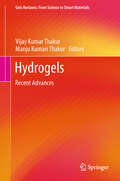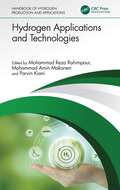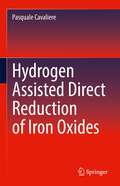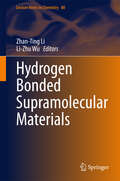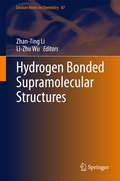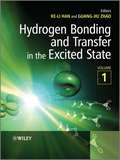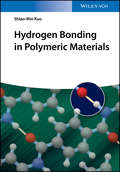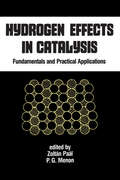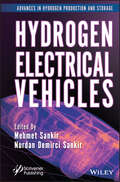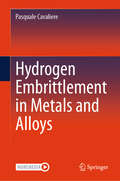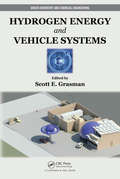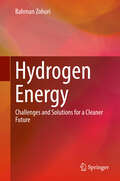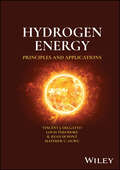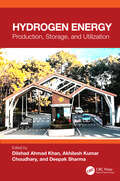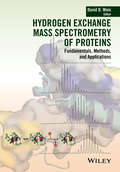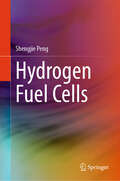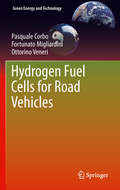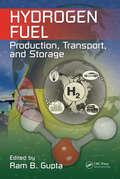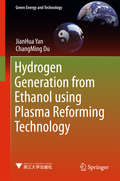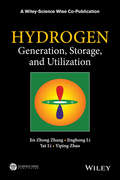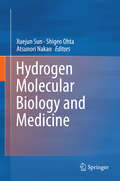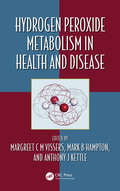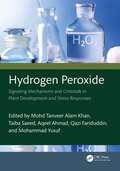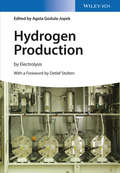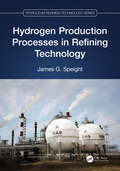- Table View
- List View
Hydrogels: Recent Advances (Gels Horizons: From Science to Smart Materials)
by Vijay Kumar Thakur Manju Kumari ThakurThis book discusses recent advances in hydrogels, including their generation and applications and presents a compendium of fundamental concepts. It highlights the most important hydrogel materials, including physical hydrogels, chemical hydrogels, and nanohydrogels and explores the development of hydrogel-based novel materials that respond to external stimuli, such as temperature, pressure, pH, light, biochemicals or magnetism, which represent a new class of intelligent materials. With their multiple cooperative functions, hydrogel-based materials exhibit different potential applications ranging from biomedical engineering to water purification systems. This book covers key topics including superabsorbent polymer hydrogel; intelligent hydrogels for drug delivery; hydrogels from catechol-conjugated materials; nanomaterials loaded hydrogel; electrospinning of hydrogels; biopolymers-based hydrogels; injectable hydrogels; interpenetrating-polymer-network hydrogels: radiation- and sonochemical synthesis of micro/nano/macroscopic hydrogels; DNA-based hydrogels; and multifunctional applications of hydrogels. It will prove a valuable resource for researchers working in industry and academia alike.
Hydrogen Applications and Technologies
by Mohammad Reza Rahimpour Mohammad Amin Makarem Parvin KianiHydrogen has wide applications across many industries, including petroleum refineries, hydrotreating processes, and metallurgy applications. In addition, a number of valuable chemicals, such as ammonia, alcohols, and acids, are manufactured directly or indirectly with hydrogen. Hydrogen Applications and Technologies covers the utilization of hydrogen in petrochemical products, vehicles, and power generation systems, as well as in refinery hydrotreating, metallurgy, welding, annealing, and the heat‑treating of metals. Describes the application of hydrogen in producing valuable chemicals in detail Comprehensively discusses hydrogen utilization as an energy source Covers the application of hydrogen in power generation systems and across various industries Reviews hydrogen’s role as an agent in chemical reactions Part of the multivolume Handbook of Hydrogen Production and Applications, this stand-alone book guides researchers and academics in chemical, environmental, energy, and related areas of engineering interested in development and implementation of hydrogen production technologies.
Hydrogen Assisted Direct Reduction of Iron Oxides
by Pasquale CavaliereThe book describes the main approaches to produce and synthesize iron and steel through hydrogen-based technologies. Depending on the processing route and on the energy demand, the best available techniques and the most forward-looking solutions are explained. The book is edited with the contribution representing a range of industries in order to evaluate the industrial feasibility of each selected technology. It presents the most efficient solutions applied by ironmaking and steelmaking factories all around the world.
Hydrogen Bonded Supramolecular Materials
by Zhan-Ting Li Li-Zhu WuThis book is an up-to-date text covering topics in utilizing hydrogen bonding for constructing functional architectures and supramolecular materials. The first chapter addresses the control of photo-induced electron and energy transfer. The second chapter summarizes the formation of nano-porous materials. The following two chapters introduce self-assembled gels, many of which exhibit unique functions. Other chapters cover the advances in supramolecular liquid crystals and the versatility of hydrogen bonding in tuning/improving the properties and performance of materials. This book is designed to bring together in a single volume the most important and active fields of hydrogen bonding strategy for designing supramolecular materials. The book will be a valuable resource for graduates and researchers working in the fields of supramolecular chemistry and materials sciences. Zhan-Ting Li, PhD, is a Professor of Organic Chemistry at the Department of Chemistry, Fudan University, China Li-Zhu Wu, PhD, is a Professor of Organic Chemistry at the Technical Institute of Physics and Chemistry, Chinese Academy of Sciences, China
Hydrogen Bonded Supramolecular Structures
by Zhan-Ting Li Li-Zhu WuThis book covers the advances in the studies of hydrogen-bonding-driven supramolecular systems made over the past decade. It is divided into four parts, with the first introducing the basics of hydrogen bonding and important hydrogen bonding patterns in solution as well as in the solid state. The second part covers molecular recognition and supramolecular structures driven by hydrogen bonding. The third part introduces the formation of hollow and giant macrocycles directed by hydrogen bonding, while the last part summarizes hydrogen bonded supramolecular polymers. This book is designed to bring together in a single volume the many important aspects of hydrogen bonding supramolecular chemistry and will be a valuable resource for graduates and researchers working in supramolecular and related sciences. Zhan-Ting Li, PhD, is a Professor of Organic Chemistry at the Department of Chemistry, Fudan University, China. Li-Zhu Wu, PhD, is a Professor of Organic Chemistry at the Technical Institute of Physics and Chemistry, Chinese Academy of Sciences, China.
Hydrogen Bonding and Transfer in the Excited State
by Guang-Jiu Zhao Ke-Li HanThis book gives an extensive description of the state-of-the-art in research on excited-state hydrogen bonding and hydrogen transfer in recent years.Initial chapters present both the experimental and theoretical investigations on the excited-state hydrogen bonding structures and dynamics of many organic and biological chromophores. Following this, several chapters describe the influences of the excited-state hydrogen bonding on various photophysical processes and photochemical reactions, for example: hydrogen bonding effects on fluorescence emission behaviors and photoisomerization; the role of hydrogen bonding in photosynthetic water splitting; photoinduced electron transfer and solvation dynamics in room temperature ionic liquids; and hydrogen bonding barrier crossing dynamics at bio-mimicking surfaces. Finally, the book examines experimental and theoretical studies on the nature and control of excited-state hydrogen transfer in various systems.Hydrogen Bonding and Transfer in the Excited State is an essential overview of this increasingly important field of study, surveying the entire field over 2 volumes, 40 chapters and 1200 pages. It will find a place on the bookshelves of researchers in photochemistry, photobiology, photophysics, physical chemistry and chemical physics.
Hydrogen Bonding in Polymeric Materials
by Shiao-Wei KuoSummarizing our current knowledge of the topic, this book describes the roles and effects of hydrogen bonding in polymer materials by reviewing the latest developments over recent years. To this end, it discusses all relevant aspects from the fundamentals, via characterization, to properties and applications in various polymeric materials, including polymer blends, block copolymers, mesoporous materials, biomacromolecules and nanocomposites. Invaluable reading for scientists in polymers and materials as well as those working in macromolecular chemistry.
Hydrogen Effects in Catalysis: Fundamentals and Practical Applications
by Zoltan Paal P.G. MenonThis book covers hydrogen effects in catalysis in the broadest sense, from surface science to industrial applications. It draws the attention of the catalysis community to the importance of the phenomena of hydrogen effects both in the science and technology of catalysis.
Hydrogen Electrical Vehicles (Advances in Hydrogen Production and Storage (AHPS))
by Mehmet Sankır Nurdan SankirHYDROGEN ELECTRICAL VEHICLES Hydrogen electrical vehicles are an essential component of the “Green New Deal” and this book covers cutting-edge technologies designed for fuel-cell-powered cars. The realization of the decision of 28 countries to keep global warming at 2 degrees and below, which is stated in the Paris Agreement, and the achievement of minimizing CO2 emissions, can only be accomplished by establishing a hydrogen ecosystem. A new geopolitical order is envisaged, in which sectors dealing with energy production, distribution, and storage, thus decreasing the carbon footprint, are reconstructed. In short, an economic order with new tax regulations is being created in which the carbon footprint will be followed. This global effort called the “Green Deal” is defined as a new growth strategy aiming at net-zero CO2 emissions. We know that the total share of transportation in CO2 emissions is about 24%. Therefore, efforts for reducing emissions must include utilizing hydrogen in transport. The subjects covered in the book include: An introduction to hydrogen and electrical vehicles; Hydrogen storage and compression systems; Hydrogen propulsion systems for UAVs; Test and evaluation of hydrogen fuel cell vehicles; Hydrogen production and PEM fuel cells for electrical vehicles; The power and durability issues of fuel cell vehicles. Audience The book will attract readers from diverse fields such as chemistry, physics, materials science, engineering, mechanical and chemical engineering, as well as energy-focused engineering and hydrogen generation industry programs that will take advantage of using this comprehensive review of the hydrogen electrical vehicles.
Hydrogen Embrittlement in Metals and Alloys
by Pasquale CavaliereThis book provides a complete description of hydrogen technologies from the basic theoretical underpinnings to the different production routes for various applications. It summarizes the most recent research findings with respect to theory and the broad array of industrial technologies currently in place as well as those under development with high potential. Special attention is given to the hydrogen embrittlement mechanisms at room and high temperatures as well as problems related to hydrogen in liquid and high-pressure compressed states. The author further describes the hydrogen diffusion embrittlement issues related to different types of metallic materials from steel to light alloys to nikel-based superalloys.
Hydrogen Energy and Vehicle Systems (Green Chemistry and Chemical Engineering)
by Scott E. GrasmanWith contributions from noted laboratory scientists, professors, and engineers, Hydrogen Energy and Vehicle Systems presents a new comprehensive approach for applying hydrogen-based technologies to the transportation and electric power generation sectors. It shows how these technologies can improve the efficiency and reliability of energy and trans
Hydrogen Energy: Challenges and Solutions for a Cleaner Future
by Bahman ZohuriThis book describes the challenges and solutions the energy sector faces by shifting towards a hydrogen based fuel economy. The most current and up-to-date efforts of countries and leaders in the automotive sector are reviewed as they strive to develop technology and find solutions to production, storage, and distribution challenges. Hydrogen fuel is a zero-emission fuel when burned with oxygen and is often used with electrochemical cells, or combustion in internal engines, to power vehicles and electric devices. This book offers unique solutions to integrating renewable sources of energy like wind or solar power into the production of hydrogen fuel, making it a cost effective, efficient and truly renewable alternative fuel.
Hydrogen Energy: Principles and Applications
by Louis Theodore R. Ryan Dupont Vincent J. DelGatto Matthew C. OgwuUnderstand hydrogen as an energy resource and its potential as a dynamic solution for a carbon-neutral economy Hydrogen is an energy carrier that can be used to store, move, and deliver energy produced from other sources. It has the potential for high energy efficiency, significant environmental and social benefits, and economic competitiveness. Traditional energy resources will not be able to meet the growing energy demand, despite the advances in energy management and energy conservation—understanding how hydrogen energy can solve this problem is crucial. Hydrogen Energy: Principles and Applications provides the information needed by energy resource planners, scientists, engineers, and government officials to make informed energy-related decisions. Divided into three parts, the book opens with an introduction to various energy issues, sources, and regulations, including the basics of thermodynamics and fuel cells. The second part addresses the practical aspects of hydrogen energy, such as availability, distribution, extraction, processing, purification, transportation, transmission, and storage. The final section details the economics, energy-environmental interactions, and ethical and political considerations of the development and use of hydrogen energy, including discussion of investment and business contacts, energy option analysis and optimization, and future prospects. Covering the fundamentals of hydrogen energy with a thorough and accessible approach, the book: Equips readers with a well-rounded working knowledge of hydrogen energy Covers the latest technological advances, economic considerations, and the role hydrogen plays in a renewable energy economy Offers a pragmatic, real-world perspective rather than focusing on theoretical issues Contains nearly 50 illustrative examples ranging from elementary thermodynamic calculations to optimization applications using linear programming Hydrogen Energy: Principles and Applications is a must-read for those working in the energy industry, particularly environmental engineering and science professionals, as well as government officials, policymakers, instructors, and trainers involved in energy-related fields.
Hydrogen Energy: Production, Storage and Utilization
by Dilshad Ahmad Khan, Akhilesh Kumar Choudhary, and Deepak SharmaSince the low energy efficiency and rise in emissions by using fossil fuels, the hydrogen economy has been considered as a unique approach to resolve these problems, making hydrogen an attractive fuel. This book titled Hydrogen Energy: Production, Storage, and Utilization describes various technologies for hydrogen production from different sources and storage in liquid, gaseous, and compound forms, which have also been covered in detail. It also highlights the various modes of transportation of hydrogen and its utilization in a variety of engineering applications such as automotive engines, fuel cells, electric power generation, and aerospace. The book also explores the safety challenges, handling issues, and future scope.This book: Covers the methods of hydrogen production including the bioconversion method. Explains the hydrogen storage technologies with proper illustrations. Includes engineering and non-engineering applications of hydrogen utilization covering the most advanced generation of fuel cells, power generation for hybrid vehicles, and space applications. Presents state-of-the-art research carried out in the domains of hydrogen production, storage, transportation, and utilization along with safety aspects. Discusses modes and methods of hydrogen transportation such as in gaseous form, liquid form, and solid form. The book has a wide scope of reaching out to diverse readers including but not limited to industrial engineers, process engineers, researchers, and academicians. The research fraternity will gain the benefit of being aware and selecting a similar recent research domain in the field of hydrogen production.
Hydrogen Exchange Mass Spectrometry of Proteins
by David D. WeisHydrogen exchange mass spectrometry is widely recognized for its ability to probe the structure and dynamics of proteins. The application of this technique is becoming widespread due to its versatility for providing structural information about challenging biological macromolecules such as antibodies, flexible proteins and glycoproteins. Although the technique has been around for 25 years, this is the first definitive book devoted entirely to the topic. Hydrogen Exchange Mass Spectrometry of Proteins: Fundamentals, Methods and Applications brings into one comprehensive volume the theory, instrumentation and applications of Hydrogen Exchange Mass Spectrometry (HX-MS) - a technique relevant to bioanalytical chemistry, protein science and pharmaceuticals. The book provides a solid foundation in the basics of the technique and data interpretation to inform readers of current research in the method, and provides illustrative examples of its use in bio- and pharmaceutical chemistry and biophysics In-depth chapters on the fundamental theory of hydrogen exchange, and tutorial chapters on measurement and data analysis provide the essential background for those ready to adopt HX-MS. Expert users may advance their current understanding through chapters on methods including membrane protein analysis, alternative proteases, millisecond hydrogen exchange, top-down mass spectrometry, histidine exchange and method validation. All readers can explore the diversity of HX-MS applications in areas such as ligand binding, membrane proteins, drug discovery, therapeutic protein formulation, biocomparability, and intrinsically disordered proteins.
Hydrogen Fuel Cells
by Shengjie PengThis book introduces in detail the different types of hydrogen fuel cells, including alkaline fuel cells, proton exchange membrane fuel cells, solid oxide fuel cells, phosphate fuel cells, molten carbonate fuel cells, direct liquid fuel cells, etc., and discusses their operating principles, performance characteristics and application fields in depth. Readers will be able to comprehensively understand the current status and future development trends of fuel cell technology to provide technical support for hydrogen energy applications. The last two chapters of the book also introduce the automotive application and development of alkaline fuel cells, and the application of hydrogen-powered transportation equipment in the field of national defense. This book is not only suitable as a teaching material or teaching reference book for senior undergraduate and graduate students of relevant majors in colleges and universities, but also suitable for scientific and technological workers engaged in scientific research and technology research and development of new energy materials and devices and related fields.
Hydrogen Fuel Cells for Road Vehicles
by Pasquale Corbo Fortunato Migliardini Ottorino VeneriHydrogen Fuel Cells for Road Vehicles addresses the main issues related to the application of hydrogen fuel cell technology in the road transportation sector. A preliminary treatment is given on fuel resources and atmospheric pollution concerns which are closely related to the current technology (internal combustion engine) used for moving people and goods. The authors deal, in particular, with the problems that can hinder a widespread hydrogen market (production, storage and distribution), as well as giving an analysis of fuel cell technologies available for utilization of this energy carrier in the automotive field. Hydrogen Fuel Cells for Road Vehicles also examines the concerns faced during the design and realization of a PEM fuel cell system with optimal size and efficiency, evidencing the impact of the individual auxiliary components on energy losses and dynamic stack performance. The book ends with the analysis of two practical case studies on fuel cell propulsion systems. Hydrogen Fuel Cells for Road Vehicles is a useful text for researchers, professionals and advanced students in the fields of automotive and environmental engineering.
Hydrogen Fuel: Production, Transport, and Storage
by Ram B. GuptaFrom Methane to Hydrogen-Making the Switch to a Cleaner Fuel Source The world's overdependence on fossil fuels has created environmental problems, such as air pollution and global warming, as well as political and economic unrest. With water as its only by-product and its availability in all parts of the world, hydrogen promises to be the next grea
Hydrogen Generation from Ethanol using Plasma Reforming Technology
by Changming Du Jianhua YanThis book provides an overview of hydrogen production from renewable resources such as ethanol using plasma or plasma-catalytic technologies. Further, it presents a balanced and comprehensive treatment of the core principles, novel plasma reactors and diagnostics, as well as state-of-the-art plasma energy applications. It brings together technological advances and research on plasma generators and their application in hydrogen production, including plasma-assisted alcohol reforming technology, plasma-catalytic alcohol reforming technology, the alcohol reforming mechanism, models of alcohol reforming for hydrogen production, the energy balance of hydrogen production from ethanol, and a comparison of alcohol reforming assisted by different plasma treatment systems. As such, it offers a valuable reference guide for scientists, engineers and graduate students in the fields of energy and environment, plasma physics and chemistry.
Hydrogen Generation, Storage and Utilization
by Yiping Zhao Jinghong Li Jin Zhong Zhang Yat LiAddresses the three fundamental aspects of hydrogen as a fuel resource: generation, storage, and utilizationProvides theoretical basis for the chemical processes required for hydrogen generation, including solar, photoelectrochemical, thermochemical, and fermentation methodsDiscusses storage of hydrogen based on metal hydrides, hydrocarbons, high pressure compression, and cryogenicsExamines the applications of hydrogen utilization in the fields of petroleum, chemical, metallurgical, physics, and manufacturingContains over 90 figures, including 27 color figures
Hydrogen Molecular Biology and Medicine
by Xuejun Sun Shigeo Ohta Atsunori NakaoThis book provides a clearly structured introduction to hydrogen biology and medicine. Hydrogen is the one of the most abundant elements in the universe and has the simplest structure. In 2007, Japanese researchers found that the selective oxidation of hydrogen has a therapeutic effect on various diseases and injuries, sparking widespread interest in the biomedical field. In recent years, hundreds of peer-reviewed papers have been published internationally reporting the positive effects of hydrogen on many human diseases, including strokes, diabetes, Parkinson's disease, Alzheimer's disease and sepsis. The authors provide readers with a comprehensive overview of this subject, from its physical and chemical properties to its biological effects, as well as the problems and obstacles that exist.
Hydrogen Peroxide Metabolism in Health and Disease (Oxidative Stress and Disease)
by Mark Hampton Margreet C Vissers Anthony J. KettleMuch of the biology of oxidative stress and oxidative signalling centres on the generation and handling of hydrogen peroxide. The overall aim for this book would be to provide an insightful and useful forum to assist with the understanding of the relevance of hydrogen peroxide generation and how this is managed in human biology. The target audience would be those who currently have an interest in the generation of ROS, but who do not have expertise in chemistry, as well as those experts in the chemistry of oxidative stress, but without detailed understanding of the biologically relevant setting. We would aim to bridge the gap in understanding between chemistry and biology.
Hydrogen Peroxide: Signaling Mechanisms and Crosstalk in Plant Development and Stress Responses
by Mohammad Yusuf Qazi Fariduddin Aqeel Ahmad Tanveer Alam Khan, Mohd Taiba SaeedHydrogen peroxide (H2O2) is recognized as a crucial signaling molecule that mediates physiological and biochemical processes in plants, regulating various development and stress responses. Hydrogen Peroxide: Signalling Mechanisms and Crosstalk in Plant Development and Stress Responses presents a comprehensive overview of hydrogen peroxide’s modes of action in plants demonstrating the important role played in plant stress signaling and communication. It introduces key topics in H2O2 research such as plant signaling, molecular responses, and interaction with other hormones.Features Discusses experiments interrelated to H2O2 signaling pathway in plants under various environmental conditions Addresses important concerns in H2O2 research from a wide range of organisms, including plants and prokaryotes such as bacteria and archaea Collects, summarizes, and presents developments in plant signaling and communication Aids scientists and breeders in developing strategies to enhance plant growth and stress tolerance Environmental stress is destructively disturbing plant growth and efficiency resulting in concerns to improve food crop yield, and H2O2 has immense field implications as it is vital in regulating plant growth and stress responses. Hydrogen Peroxide: Signalling Mechanisms and Crosstalk in Plant Development and Stress Responses is an invaluable resource for researchers and scientists to use as a guide to conduct studies on environmental conditions of the plant hydrogen peroxide signaling systems.
Hydrogen Production
by Agata Godula-Jopek Detlef StoltenCovering the various aspects of this fast-evolving field, this comprehensive book includes the fundamentals and a comparison of current applications, while focusing on the latest, novel achievements and future directions. The introductory chapters explore the thermodynamic and electrochemical processes to better understand how electrolysis cells work, and how these can be combined to build large electrolysis modules. The book then goes on to discuss the electrolysis process and the characteristics, advantages, drawbacks, and challenges of the main existing electrolysis technologies. Current manufacturers and the main features of commercially available electrolyzers are extensively reviewed. The final chapters then present the possible configurations for integrating water electrolysis units with renewable energy sources in both autonomous and grid-connected systems, and comment on some relevant demonstration projects. Written by an internationally renowned team from academia and industry, the result is an invaluable review of the field and a discussion of known limitations and future perspectives.
Hydrogen Production Processes in Refining Technology (Petroleum Refining Technology Series)
by James G. SpeightThis book details the various approaches to the production of hydrogen in petroleum refining. The need for hydrogen is addressed, and then the differences between the processes are detailed. This practical and accessible guide is written for managers, professionals, and technicians as well as graduate students transitioning into the refining industry.Key Features: Describes hydrogen purification methods and processes, providing relevant process data and fully describing process operations Describes hydrogen purification methods and processes, detailing the types of feedstock that can be used and exploring the options and parameters of each process Details commercial processes, including gasification pretreatment and reactions and considers next-generation processes and developments
